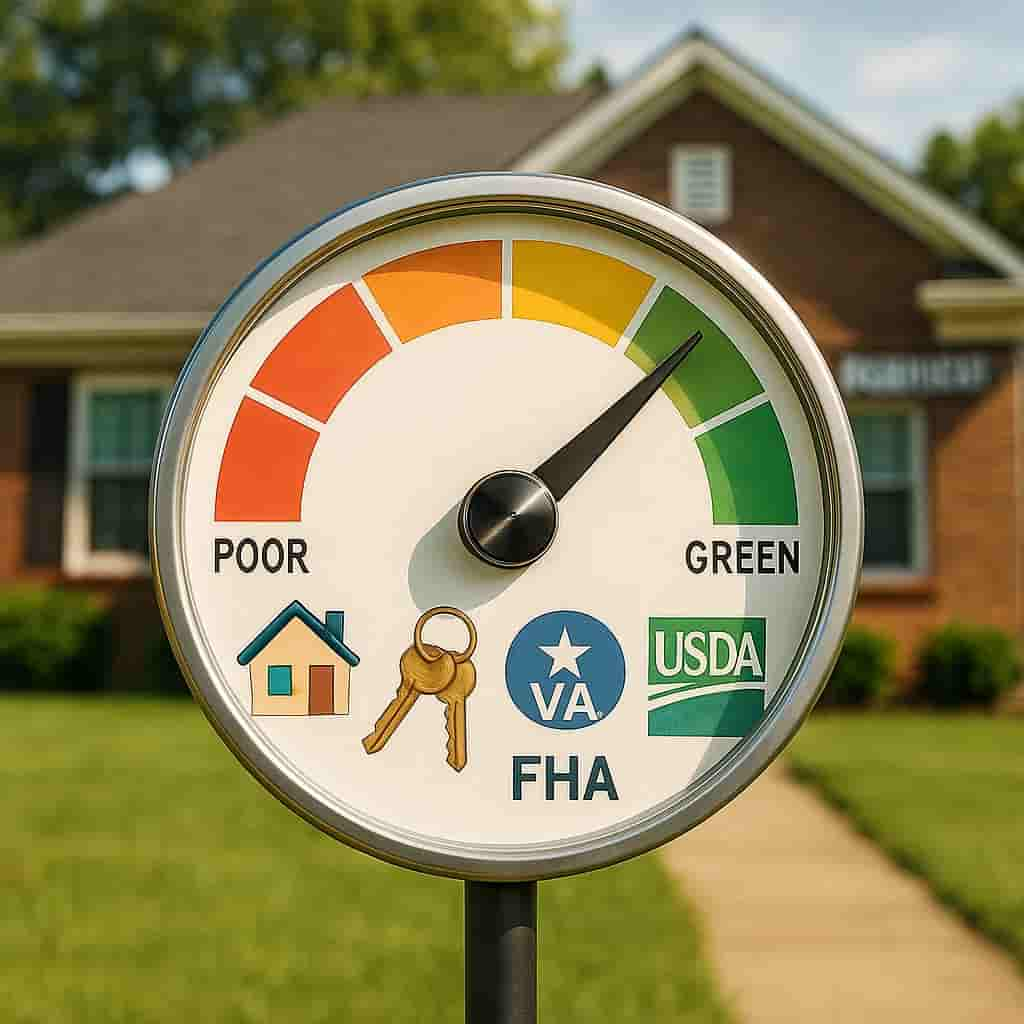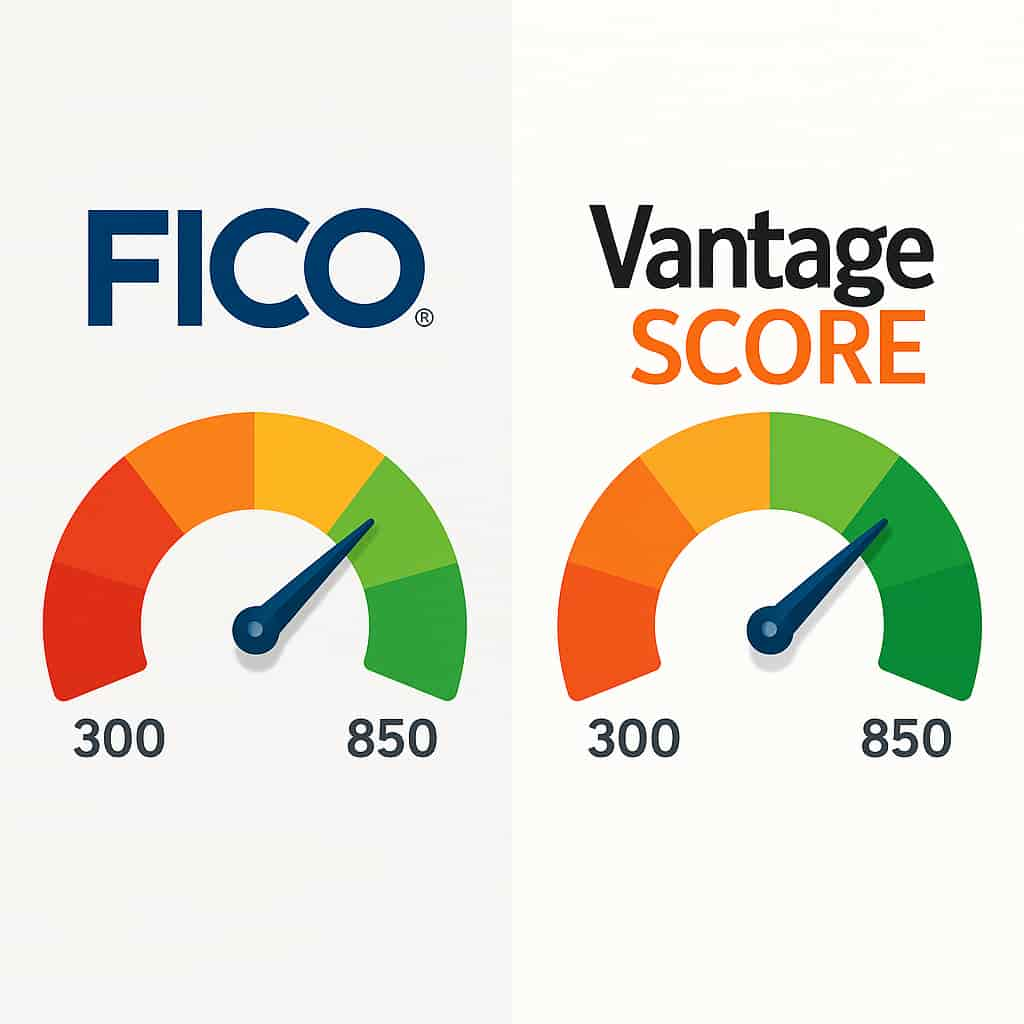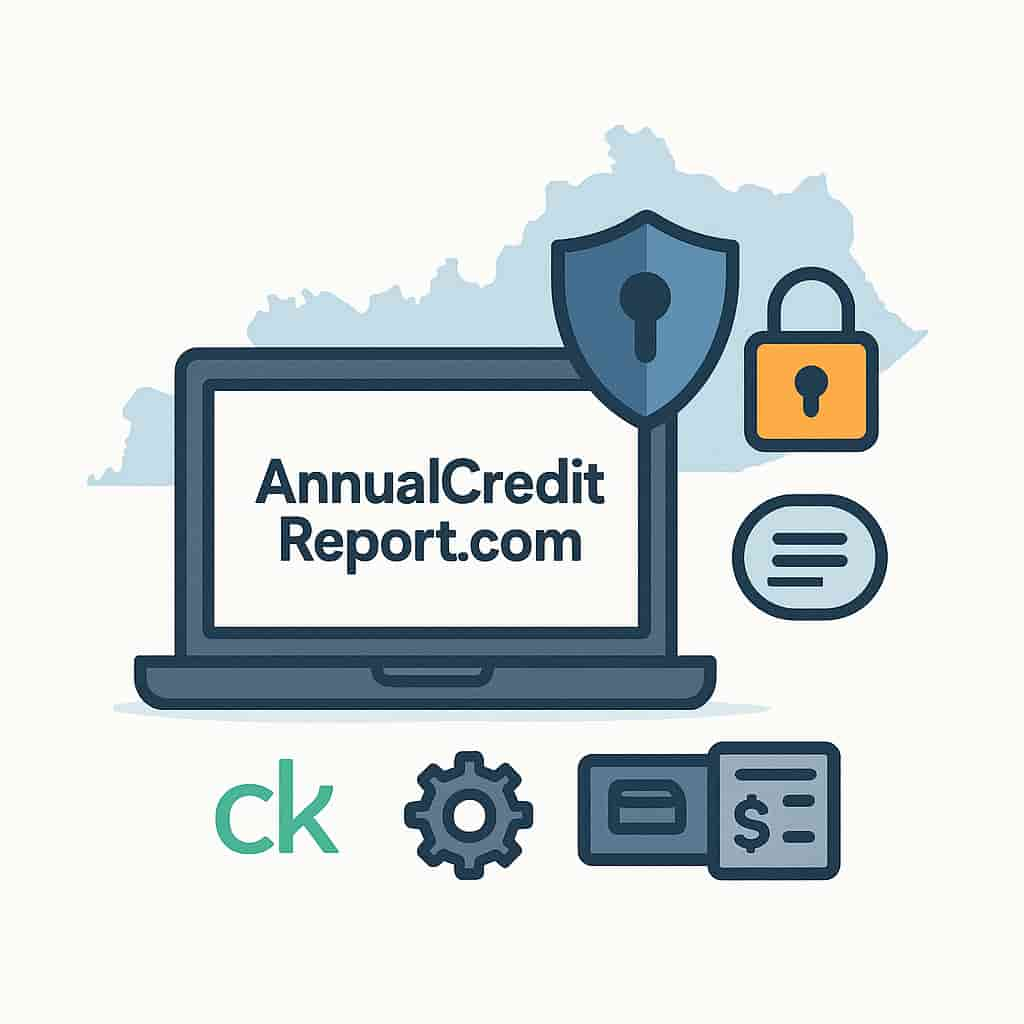Credit Score to Buy a Home in Kentucky
Buying a home in Kentucky starts with more than just finding the right property—it begins with understanding your credit score. Lenders use this three-digit number to measure how likely you are to repay your loan, and it directly impacts whether you qualify for a mortgage and what interest rate you’ll receive. In today’s housing market, even a small difference in your credit score can translate into thousands of dollars saved—or lost—over the life of your loan. Whether you’re looking at a starter home in London, a farm in Laurel County, or a suburban property near Lexington, knowing the credit score requirements in Kentucky will put you in the best position to get approved and secure affordable financing.
|

|
Why Credit Score Matters for Home Buying
|
Credit scores as the foundation of home buying
- Your credit score is one of the most important factors in the mortgage process. Lenders use it as a snapshot of your financial reliability, and it can determine not only whether you’re approved for a loan but also how much you’ll pay over time. A higher score signals lower risk to the bank, which often means lower interest rates and easier access to different loan programs. For Kentucky buyers, where affordability and rural lending programs like USDA loans are common, understanding your score upfront is essential to getting the best deal.
|
How lenders evaluate your score
- Mortgage lenders consider your payment history, outstanding debts, credit mix, and length of credit history. These details are weighed into your overall score to assess how dependable you are as a borrower.
Impact on interest rates
- Even a small difference in your score—say 680 versus 740—can mean a major change in your monthly mortgage payment. Higher scores usually unlock better rates, saving you thousands over the life of the loan.
|
Connection to mortgage approval odds
- While income and debt levels matter too, your credit score is often the first gatekeeper. A strong score increases your odds of approval across FHA, VA, USDA, and conventional loans.
|
Why Kentucky buyers should care
- Kentucky’s housing market is fueled by a mix of first-time buyers and rural property seekers. Programs like USDA loans require stronger credit histories, and state-specific lender overlays may raise minimum score expectations. Knowing your score early keeps you prepared for these Kentucky-specific lending conditions.
|
|
PRO TIP – from Williams Elite Realty
Lenders usually pull all three bureaus and use the “middle score.” Focus on building consistency across the board, not just one report.
|
|
Minimum Credit Scores for Loan Programs
|
|

|
Why minimum scores matter
- Every mortgage program sets its own credit score requirements. These benchmarks give lenders confidence that you can manage monthly payments, and they also decide how much flexibility you’ll have with down payments. For Kentucky buyers, knowing the minimum scores upfront helps you avoid surprises and focus on the loan programs that truly fit your situation.
Kentucky lender overlays explained
- Even if a national guideline says one score is “enough,” individual Kentucky lenders often apply overlays—stricter rules on top of federal standards. For example, some banks may set their FHA minimum at 620 even though FHA itself allows 580. It’s important to compare lenders locally, since overlays can vary widely across the state.
- Visit the Financing Options Page for more information on progarms and options available to Kentucky Home Buyers.
|
FHA loans (580+ with 3.5% down, 500–579 with 10% down)
- The Federal Housing Administration (FHA) is popular with first-time buyers. If your score is 580 or higher, you may qualify with just 3.5% down. Scores between 500–579 may still be eligible, but require at least 10% down. Visit HUD's FHA Page for more information.
|
VA loans (usually 620+, flexible for veterans)
- VA loans, backed by the Department of Veterans Affairs, don’t technically require a minimum score. Most Kentucky lenders, however, look for 620+. Because these loans carry no down payment, lenders want to ensure borrowers have a reliable credit history. Visit VA Home Loan Benefits Page for more Information.
|
USDA loans (640+ recommended, rural focus)
- Designed for rural and small-town buyers, USDA loans typically require a 640+ score for streamlined approval. Manual underwriting is sometimes possible for slightly lower scores, but approvals are stricter. This program is widely used in Kentucky’s rural counties. Visit USDA's Rural Housing Loan Program Page for more information.
- ➤View Rural Housing's USDA Info Sheet
|
Conventional loans (620+ minimum, best rates 740+)
- Conventional mortgages set 620 as the minimum score, but the best rates and lowest private mortgage insurance (PMI) costs generally go to buyers with 740+ scores. These loans work well for buyers with stronger credit and higher down payments.
|
|
PRO TIP – from Williams Elite Realty
National program minimums (like FHA 580) are starting points—but many Kentucky lenders add overlays. Always check with at least two local lenders before applying.
|
|
Breaking Down the Three Credit Bureaus
|
Why three bureaus matter
- When you apply for a mortgage, lenders usually check all three major credit bureaus: Equifax, Experian, and TransUnion. Each bureau collects your credit data from banks, credit cards, and other lenders—but they don’t always have the same information. That’s why your scores may look slightly different depending on which bureau is reporting.

|
Equifax overview
- Equifax is one of the oldest credit agencies, tracking consumer credit history since the late 1800s. It provides lenders with detailed reports that weigh heavily on payment history and balances. Visit Equafax's Page for more information
|
Experian overview
- Experian offers broad coverage, including rental payments and utilities in some cases. Many mortgage lenders favor Experian because of its extensive data pool and fraud prevention tools. Visit Experian's Page for more information.
|
TransUnion overview
- TransUnion often focuses on emerging credit data, such as alternative payment histories. Its reports can sometimes capture accounts missed by other bureaus, which may influence your score positively or negatively. Visit TransUnion's Page for more information.
|
Why scores differ by bureau
- Not all creditors report to all three bureaus. One lender may update Experian but not TransUnion, leading to score differences. Mortgage lenders usually pull a “tri-merge” report, then use the middle score (not the highest or lowest) to qualify you for a loan.
|
|
Need guidance on improving your credit?
Visit our Credit Tips and Repair page for helpful resources and expert advice
|
|
PRO TIP – from Williams Elite Realty
Since each bureau may hold slightly different data, reviewing all three reports is the only way to catch errors before your lender sees them.
|
|
Understanding Credit Scoring Models
|
Why scoring models matter
- Not all credit scores are created equal. The number you see on a free app may not match the one your mortgage lender pulls, because different scoring models weigh your credit data in different ways. Understanding these models helps you know which score really matters when buying a home in Kentucky.

|
FICO score (most widely used for mortgages)
- The FICO score is the gold standard for mortgage lending. Most lenders rely on it to approve applications, set interest rates, and assess borrower risk. Versions like FICO Score 2, 4, and 5 are still widely used in mortgage underwriting. Visit My FICO's Education center for more information.
|
VantageScore (alternative model)
- Developed by the three major credit bureaus, VantageScore is often used by free credit apps. While it gives you a good sense of your credit health, it may differ by 20–40 points from the FICO scores lenders use for mortgages. Visit VantageScore's page for more information.
|
Industry-specific models (auto, card, mortgage)
- FICO also creates industry-specific models—like auto or credit card scoring versions—that adjust how certain behaviors are weighed. These aren’t used for mortgages but explain why you may see multiple “FICO scores.”
|
Why scores can vary by platform
- Credit Karma, bank apps, and mortgage lenders may all show slightly different scores. This doesn’t mean one is wrong—it simply reflects the scoring model and data source being used. For mortgage purposes, your FICO mortgage score is the one that counts.
|
|
PRO TIP – from Williams Elite Realty
Your FICO mortgage score is usually lower than the free scores shown on apps. Don’t panic—lenders expect this difference and base approvals on FICO, not VantageScore.
|
|
Free Credit Reports and Monitoring Tools
|
Why checking your credit matters before buying
- Before applying for a mortgage, it’s smart to review your credit reports and scores. Errors, outdated accounts, or missed payments could hurt your approval chances—and fixing them takes time. Checking your reports in advance gives you a chance to correct mistakes and strengthen your profile.
AnnualCreditReport.com (official free reports)
- The official site, AnnualCreditReport.com, is the only federally authorized source for free credit reports from all three bureaus. You can access each report once a year, and during certain periods (like after the pandemic) more frequent pulls may be offered. Visit AnnualCreditReport.com's Page to get your free credit report.
Credit Karma (estimates & monitoring)
- Credit Karma provides free score estimates and monitoring tools. While it usually shows VantageScore instead of FICO, it’s helpful for tracking trends, alerts, and account changes over time.
- While Credit Karma is useful for tracking changes, its VantageScore model isn’t the same as the FICO scoresmortgage lenders use. For some people, the difference may be small, but for others it can vary by 20–40 points or more—which can make a real impact on loan approval and interest rates.
|

|
Other monitoring tools
- Banks, credit card issuers, and some identity protection services offer free credit tracking. These can be useful for spotting suspicious activity and ensuring all accounts are being reported correctly.
|
Why reviewing reports matters before buying
- Mortgage lenders will spot every account, collection, and late payment—so you should too. Reviewing your reports early helps you catch errors, plan for payoffs, and approach your Kentucky lender with confidence.
|
|
PRO TIP – from Williams Elite Realty
Get your free reports at AnnualCreditReport.com, but use tools like Credit Karma for ongoing monitoring. Just remember, those scores are only estimates.
|
|
Preparing Your Credit for Homeownership
|

|
Why preparation matters
- Strong credit doesn’t happen overnight. Before you apply for a mortgage in Kentucky, small steps—like making on-time payments or reducing balances—can boost your score and improve your loan options. Even modest improvements can mean better approval odds and lower interest rates.
Payment history importance
- Your payment history makes up the largest portion of your credit score. Late or missed payments stay on your report for years, so keeping every account current is key. Setting up auto-pay or reminders can help you maintain consistency.
Keeping balances low
- Credit utilization—the percentage of available credit you’re using—also weighs heavily. Keeping balances below 30% of your limits shows lenders you manage debt responsibly. Paying down cards before applying for a loan can make a measurable difference.
|
Avoiding new hard inquiries
- Each time you apply for new credit, a hard inquiry appears on your report. Too many in a short period can lower your score and raise red flags for lenders. Limit new accounts in the months leading up to your mortgage application.
|
Kentucky lender expectations
- Many Kentucky lenders apply overlays, meaning they set higher standards than national loan minimums. For example, while FHA allows 580, a local lender may require 620. By preparing early, you’ll meet not only federal requirements but also local lending guidelines.
|
|
PRO TIP – from Williams Elite Realty
Paying down even one high-balance credit card can quickly lower your utilization rate—and that’s one of the fastest ways to boost your score before buying.
|
|
|






